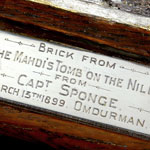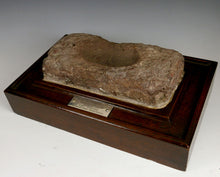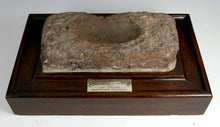A Trophy from the Re-Conquest of the Sudan, 1898
Adding product to your cart
11.5cm (in) x 24cm (in) x 4cm (in)
Provenance: Used as a door stop in an Irish country house.
In the form of a Nile mud brick set in an oak surround applied with plaque inscribed ‘BRICK FROM / THE MAHDI’S TOMB ON THE NILE / FROM / CAPT. SPONGE / MARCH 15th 1899 OMDURMAN’.
At the arrival of General Kitchener's army before the twin capitals of Omdurman and Khartoum in September 1898, the rocket-topped tomb of the Mahdi - Muhammad Ahmad bin Abd Allah (1844-1885) - proved an irresistible target to the British gunners who blasted great chunks out of its colossal dome. It was a stark demonstration of the fate that awaited the Khalifa’s army of some 60,000 ‘servants of Allah’ whom Winston Churchill likened to no more than a ‘twelfth-century Crusader army’ armed with spears, swords, and with hundreds of banners embroided with Koranic texts.
Read more
Following the slaughter of 15,000 ansar in open battle on the 2 September, Kitchener swiftly consolidated British supremacy over the Nile and all that that entailed by the harshest of measures. Such included obliterating all physical traces of Mahdism and on his orders the remains of the Mahdi’s tomb were destroyed by General Gordon's nephew, 'Monkey', who, somewhat unsportingly threw the ‘Guided One’s bones into the Nile.
The identity of 'Captain Sponge' however remains something of mystery. Army and Navy lists of the day are devoid of Sponges, however Hart’s Army List of 1899 throws up one possible contender in Surgeon-Captain Spong, assuming Sponge to be a jovial elaboration of Spong. Certainly Spong's career profile gives credence to the possibility.
A member of a medical family, Charles Stuart Spong attended Epsom College, London University and Guy's Hospital where he captained the rugby football fifteen in 1881-82. After joining the Army as a Surgeon in 1887, he was seconded to the Egyptian Army in 1890, and served through the Re-Conquest of the Sudan as S.M.O. to the 1st Egyptian Brigade; his service including the Expedition to Dongola in 1896 for which he received the Order of Medjidie Fourth Class, and in operations leading to the Battle of Omdurman and final advance on Khartoum for which he was awarded the Distinguished Service Order; the insignia being sent to the G.O.C. Egypt, and presented at a full dress parade of the Cairo Garrison on 20 December 1899. Spong, or possibly ‘Sponge’, was later medical officer to the Egyptian State Railways. He married an American, Mary Barnsley, daughter of the late Henry Y. Pickering, of Titusville, PA.






